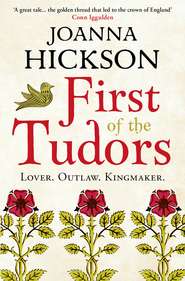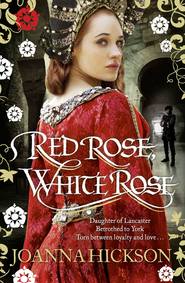По всем вопросам обращайтесь на: info@litportal.ru
(©) 2003-2024.
✖
The Tudor Bride
Автор
Год написания книги
2018
Настройки чтения
Размер шрифта
Высота строк
Поля
‘Surely the king will get word soon about their circumstances,’ I suggested, wondering why she had sought me out.
‘He and my mother are talking about raising the ransoms at this very moment. Of course, Edmund’s will not be too onerous for he is only a young squire, but John’s will be crippling, an earl’s ransom, even though he is not yet knighted. My mother will have to leave the queen and go to our estates in order to raise the necessary funds. That is why I wanted to speak to you.’ She gave me a rather watery smile. ‘I wondered if you would put in a good word for me with the queen because I really do not wish to accompany my mother on a long trek around Kent and Somerset, but nor do I want to hurt her feelings by refusing to go with her.’ She looked a little guilty as she said this, but persisted eagerly. ‘I would hate to lose my place in the queen’s household and I am sure you can persuade her grace to ask my mother to let me stay on. On the way south we are to pick up my little sister who has been staying with my aunt and Margot will keep my mother company much better than I could. They have not seen each other for nearly a year and she is much more accomplished than I am. I am afraid my boyish ways rather annoy our mother, now more so than ever.’ She opened her huge speedwell-blue eyes wide in earnest supplication. ‘Please say you will help me, Madame Lanière!’
I have to confess that, despite the sad circumstances, it was a pleasant feeling to be at the receiving end of a plea from a member of the nobility. It would certainly not have happened in the French court, where I had been a servant of low birth. In England, where I was a courtier, few people were aware of this and Lady Joan, whether aware or not, was only interested in exploiting my influence with Catherine.
I smiled at her, a beautiful girl, so different from the style-obsessed demoiselles of the French court. ‘I cannot guarantee success, Mademoiselle, but I will take your part with the queen on one condition,’ I said. ‘You must assure me that you do not wish to remain at court in order to pursue some unsuitable romance with a young and ill-bred squire. Your lady mother has been very kind to me and I would not like to do her a disservice by inadvertently bringing her distress, especially at this time of her profound grief.’
Lady Joan looked crestfallen. ‘I am sorry that you would even think that of me, Madame,’ she said indignantly. ‘I am the one female among the queen’s ladies who would rather chase a deer than dawdle in a pleasure garden. Did you not hear that I gave one stupid squire a thick lip for his wandering hands during a galliard?’ She gave me a sidelong glance – a flash of bright blue filtered through thick, dark lashes. ‘I do not know who I will marry, but I do know that it will not be a booby such as that.’
I detected a rather endearing touch of the convent schoolgirl in Lady Joan’s pugnacious prudery, very similar to the queen’s.
‘I have poured my heart out to my horse over the past two days. She is the most loyal of creatures, aren’t you, Artemis?’
She leaned forward and scratched her pretty dappled mare fondly between the ears. The horse responded with a flick of those ears and a little sideways swerve, which almost sent her into the path of a well-lathered horse galloping past us ridden by a man in royal livery. Lady Joan clung to the saddle like a limpet, calming her startled mare with a steadying hand and giving a little cry of excitement.
‘That might be a dispatch from France! I must go and see. Au revoir, Madame – and thank you!’
I watched her horse dance away on dainty hooves, following the messenger’s sweating courser, and wondered what Lady Joan’s real reason was for wanting to stay at court.
7 (#ulink_b51858ce-0ffb-5629-a0fa-82ede908a45b)
We French have always believed St George to be an Anatolian knight-errant who, among other chivalrous acts, fought crusades in the Holy Land, slew a dragon in Cyrenia and was finally executed there for refusing to deny his Christian faith, but the English placed his feats in a whole variety of other places, most of which were located within a few days’ ride of Windsor. Rather than being a Mediterranean martyr, in English eyes St George was a local hero, greatly honoured for pursuing and killing a dragon which had terrorised the maidens of numerous English villages. King Edward III had named his new palace at Windsor St George’s Hall and his great-grandson had given the saint much of the credit for his Agincourt victory. King Henry had planned a tournament to celebrate the Feast of St George on the twenty-third of April, a week after arriving back at Windsor. Knights from all over England, those who were not involved in the French campaign, had been invited to take part and began riding in the middle of the month but a downpour had turned the tourney ground to a quagmire. The event had therefore been postponed until the first of May. Like the king’s recent pilgrimage around England’s shrines, the tournament had a hidden agenda.
‘With the borders relatively peaceful, most knights will surely be glad of the chance to flex their fighting muscles and it will be a good opportunity to recruit more lances for France,’ King Henry observed to his brother Humphrey one morning as they prepared for arms practice together.
The Duke of Gloucester had ridden in the previous night, full of his usual flamboyance and self-assurance. ‘I am still short of knights ordinary for my contingent,’ he admitted. ‘I will tell my captains to keep an eye out for likely recruits.’
The two brothers were standing outside the barrier surrounding the area of hard sand where knights and men at arms practised their fighting skills. Squires worked busily around them, buckling on various pieces of armour. Part of the reason for arms practice was to maintain fighting fitness, so heavy plate and mail was worn to give their muscles a proper work-out.
After the downpour, spring had re-asserted itself and Catherine had asked the king for a chance to watch him at practice. She had brought her ladies with her to spectate and their fashionable gowns made bright splashes of colour against the grey walls of the castle. I noticed several of the bolder young ladies, particularly Joanna Coucy, casting eloquent sidelong glances in Gloucester’s direction. A bachelor prince who was so closely related to the reigning monarch was inevitably going to attract female attention, although Humphrey affected to ignore their sly scrutiny, restricting his attention to Catherine.
‘Since I am supporting my brother in France on this campaign, Madame, you may be sure that your lord will be in safe hands.’
It had already been announced that during King Henry’s next campaign, Humphrey and his brother John of Bedford would swap their roles as king’s lieutenants in England and France, but I could see that Catherine was not enormously impressed with Humphrey’s flagrant boast.
‘If your hands prove as safe as his were when he defended you against all comers after you were felled at Agincourt, my lord of Gloucester, that will indeed be great reassurance.’ Noticing his flush of irritation at her reference to the king’s famous battlefield rescue of his youngest brother, she was unable to suppress a twitch of her lips before turning to her husband with an eager query, ‘Where will be the best place to view your swordplay, my lord? I so look forward to watching you hone your legendary skills.’
Clearly riled at being put in his place by a woman, Gloucester cut in with a glacial smile, ‘So you like to see men sweat, do you, Madame? Or perhaps it is blood you relish? If so, I fear you will be disappointed. We spar only with wooden swords – see!’ His squire had just placed the practice sword in his hand and he thrust it towards Catherine, making her jump back.
King Henry rounded on his brother furiously. ‘How dare you, sir! A knight never shows the point of his sword to a lady, let alone a queen, as well you know. You will apologise at once or consider yourself on a charge of treason!’
With a shaky laugh, Humphrey hastily drew back his weapon. ‘Steady, brother. It was only a play thrust, I meant no harm.’ Nevertheless, seeing the king’s fierce expression, his bow to Catherine was so abasingly deep, he almost kissed his own kneecap. ‘I humbly beg your grace’s pardon if I startled you.’
This was not enough for King Henry, who abruptly shoved his brother in the back, making him stumble to the ground. ‘On your knees, villain! Apologise on your knees!’ he ordered. ‘You have offended the queen, not merely startled her. I should make you eat dust.’
Humphrey shot an astonished glance at Henry, as if expecting him to break suddenly into a laugh, before realising that he was fiercely in earnest and swivelling back to fall on his knees before Catherine. All bluster apparently gone, he bent forward to gather a handful of dirt from the ground which he held out to her and said, ‘On my knees I abjectly crave your grace’s forgiveness. If you so desire, I will indeed eat the dust from beneath your feet.’
Catherine’s intense look of gratitude to the king surprised me and the determination of her riposte to the duke was equally unexpected. It was also delivered in French, which gave it added fluency and authority. ‘I crave dust as little as I crave blood or sweat, my lord Gloucester. But I demand and I will have the respect due to the wife of your king; so I will pardon your sword thrust, but I will not forgive any repeat of the disrespectful thrust of your original remarks.’
Humphrey was taken aback. Expecting only a formal acknowledgement of his insincere grovel, he was more than a little shocked by her robust rebuttal of his veiled insinuation that she might have an unnatural lust for blood and sweat, so it was a somewhat sullen Gloucester who rose, frowning, to his feet, backed away and followed his brother across the sand towards the row of pells at one end of the practice ground. I detected more than a trace of venom in the violent blows he immediately began to inflict on the quilted padding of the stout pell-post, a far cry from King Henry’s deft thrusts and lunges.
I noticed Walter Vintner approaching from the palace with an impressive-looking missive in his hand. He bent his knee to Catherine. ‘This has just come for the king, your grace; it is from the Duchess of Hainault and I believe his grace will want to consider its contents with all speed.’
Like all the king’s official correspondence, the seal had been broken and the letter read by his chief clerk so Catherine was able to scan its contents. It was written in Latin, the universal diplomatic language of Europe.
‘It is from Jacqueline, Mette,’ she confided, moving nearer to me so that her voice did not carry to the rest of the spectators. ‘Jacqueline of Hainault, who was married to my poor brother Jean, if you remember. Her father died soon after Jean did and left her heir to the territories of Hainault and Holland. Then I believe she married her cousin the Duke of Brabant, although it seems not willingly.’ Her brow creased with concern as she read on. ‘Now she is in terrible trouble and asking for our help.’ She nodded at Walter dismissively. ‘You are right, Master Clerk; his grace will want to deal with this immediately. I will see that he gets it.’
We moved to the seating area where Catherine perused the letter more closely.
Nearly an hour passed before the king and Gloucester abandoned their energetic assaults on the pells and wandered across to the barrier to take refreshment. Their faces were glistening with sweat and both men hastily removed the heavy gauntlets they had been wearing in order to grasp the cup of the wine their squires poured for them. Catherine immediately approached the king and drew him aside to read the letter, while the duke took the opportunity to stroll over to the spectator stand where Catherine’s ladies still sat. He rapidly had the three Joannas giggling at some light-hearted remark, but his dallying was interrupted when King Henry strolled up and thrust the letter into his brother’s hands.
‘You had better read this, Humphrey,’ he said. ‘The Duchess of Hainault and Brabant is a lady in distress. You may have met her in Flanders when you stood hostage for the Duke of Burgundy during our peace talks in Calais four years ago.’
Humphrey pondered this suggestion but shook his head. ‘No, although I did hear talk of the new dauphin’s beautiful wife. Would that be the same lady?’
‘Yes, but she was not dauphiness for long, as Prince Jean died soon after that and she married the Duke of Brabant. Not a successful union it seems. Anyway, she is in Calais now and asks permission to come to England. Awkward though it may be in view of her close relationship with our ally Philippe of Burgundy, I do not see how we can refuse. Greeting her is a job for the Lord Warden of the Cinq Ports but, although we must regard her as an honoured guest, I would not advise carrying her ashore in one of your infamous chair-litters. This lady is reputed to need careful handling.’
Catherine protested at this. ‘I think that is a little unkind, my lord. Her husband is a violent brute and the Burgundians have invaded her territory. She deserves our sympathy.’
Ignoring this outburst, Humphrey returned his attention to the letter, but King Henry gave Catherine a quizzical look. ‘Another way of looking at it may be that she has run away from her husband and abandoned her people. Not something any prince worth his honour would do.’
‘But she is not a prince,’ Catherine insisted. ‘She is a princess who has been forced into marriage with a half-wit cousin by the Duke of Burgundy on the basis that there will be no offspring to inherit either of their territories, meaning that in due course he can add them to his own. That is manipulation of the ugliest kind and Burgundy should surely not be allowed to get away with it. Jacqueline is connected to every royal house in Europe and might have been Queen of France, if my brother Jean had not died before his time. She deserves our help.’
King Henry forced a placatory smile, clearly unwilling to enter into a public debate on the subject. ‘I understand that you have sympathy for your former sister-in-law, Catherine, and with that in mind I will agree to let her come to England, even though it will undoubtedly annoy Philippe of Burgundy who, I am sure I do not need to remind you, is our greatest ally against the forces of the Pretender. Now, let us drop the subject.’
Catherine allowed him to take her hand and lead her back to her seat on the dais, but from where I stood I could see a mutinous expression that the king did not see. King Henry immediately went to speak to his brother, who was again surrounded by a giggling gaggle of young ladies.
‘Well may you practise your charm, Humphrey,’ I heard the king remark in a tone too low for Catherine’s hearing. ‘You may soon need all you can muster. I will send a courier to Calais today and I suspect that Duchess Jacqueline will waste no time in taking ship for Dover. If you take the highway tomorrow, you should be there in time to greet her and bring her back to Windsor for the tournament. You do not want to miss that!’
Following the talk about the Duchess of Hainault’s letter, Catherine became unusually quiet for the rest of our stay at the practice ground. She waited to reveal the reason for this until we were in her bedchamber with no men present, preparing her for dinner in the great hall.
‘Why should a woman have no say in her own future, even when she is the ruler of her own country?’ she asked indignantly as Agnes and I removed her fur-lined heuque and began to unlace the warm woollen kirtle beneath. Sensing that the question was rhetorical, we exchanged quizzical glances, but remained silent, expecting further enlightenment. Being the maid of honour on duty, Lady Joan busied herself in the queen’s jewellery chest, selecting the pieces to be worn and sensibly keeping her counsel.
‘If we show the slightest sign of exercising any power, even power that is legally ours, we are instantly considered to be difficult or, as my lord puts it, to “need careful handling”.’ Catherine glanced round at the three of us, still busy at our tasks. ‘Not one of you speaks, but you all know what I mean. Joan, has your mother never complained of such things?’
Lady Joan looked up from the jewel casket, her cheeks hot. ‘Not in my hearing, your grace,’ she said diplomatically.
Catherine shrugged and sat down on her dressing stool. Agnes moved in to arrange her hair more elaborately for the formal headdress she would wear with her elegant ground-sweeping gown. I had not yet noticed any of the court ladies copying Catherine’s French fashions, but it could be only a matter of time before there was a rash of steeple hats and houppelandes.
Agnes began to twist handfuls of Catherine’s hair into ropes, pinning them to the crown of her head. ‘Have you ever met the Duchess of Hainault, Madame?’
‘No.’ Catherine shook her head, tugging against the tress her attendant was arranging. ‘Ouch, be careful, Agnes! Well, I was at her wedding when she married my brother Jean, but we were all children then and I do not remember her except as a bride in the cathedral at Compiègne. Charles met her later, when she was the dauphiness, and said she was very beautiful but heiresses are always beautiful to men, are they not?’
‘Will she live here at the English court now?’ Lady Joan laid a collar of Lancastrian SS gold links set with diamonds on the dressing chest, ready to drape around Catherine’s shoulders. ‘After she arrives, I mean.’
‘We shall have to see if we like her,’ Catherine responded. ‘She may not fit in with our merry little band. You are happy that you stayed with me, are you not, Joan? Or do you miss your mother?’
This double question flustered Lady Joan. ‘Oh yes – I mean no. Well, I miss my lady mother, of course, but I am very happy that you managed to persuade her to let me remain in your service, Madame.’









